Like so many aspects of business, accountancy practices have made their ascent into the cloud. For accountants, that means more automation and less number crunching. What today’s customers expect from them isn’t merely talking around spreadsheets. They expect meaningful conversation and actionable advice, based on solid data. Accountants need to connect with their customers. Remarkable Practice is a UK-based consulting firm that helps and inspires them to do so.
In this article, we highlight 3 Pointerpro applications by Remarkable Practices, all enhanced with personalized PDF report generation. In case you want to skip straight to them:
Meet Sally: Business Analyst & Digital Strategist at Remarkable Practice
Sally Wallwin operates on the intersection between digital product development and digital marketing for accountants. Sally and her colleagues develop new ways and strategies for their firm to connect with customers: accountancy firms. At the same time, they get these ambitious firms to apply the same remarkable practices with their own business owner clients.
We sat down with Sally and were delighted to find out Pointerpro has proven to be a multi-purpose tool for Remarkable Practice.
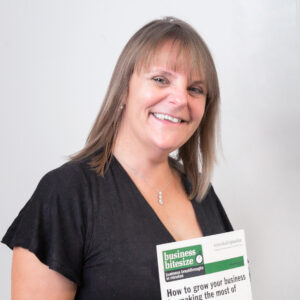
“I can’t overemphasize the benefit of Pointerpro as a facility for our business and that of our customers.”
Sally, thanks for doing this interview. Let’s get straight into it. What have you been using Pointerpro for?
Well, first of all, the way we use the tool has evolved and become more diverse. Very simply put, it started off with us having particular questions that we wanted to ask particular customers – digitally.
But the more we worked with it, the more we came across new ways of putting the tool to use for ourselves and our customers. The key element of your assessment platform for us is the Report Builder. That feature has really opened doors for us to different conversations and different ways of starting conversations.
Especially in comparison with how we did things before Pointerpro.
Can you give an example of how you did things before Pointerpro vs now?
Yes. The very first questionnaire that we ever created was really set up as a research tool to gauge the temperature of the accountancy sector: “Where and how are different firms operating?”, “What challenges are they dealing with?”… those types of things.
That meant we were building up a database with current and up-to-date knowledge about accountants and how they were feeling. It was all about understanding – and providing value in a way that genuinely helped them.
Then once we found out about Pointerpro and its Report Builder, we realized that this type of practice could be a very targeted way to interact with individual customers – for instance, to benchmark them versus groups of other accountants.
Now, by encouraging accountants to complete these Pointerpro-built questionnaires, we also saw its potential as an “accounting lead generation tool,” if you will. It could help us introduce our accounting expertise and advisory services to accountancy firms.
1. Lead generation for accounting firms: The “Humanise The Numbers” Scorecard
Can you tell us more about that lead generation use case?
So, we have this “Humanise The Numbers” scorecard, on our website homepage. It’s a short assessment that evaluates the way a firm operates and how customer-focused it is.
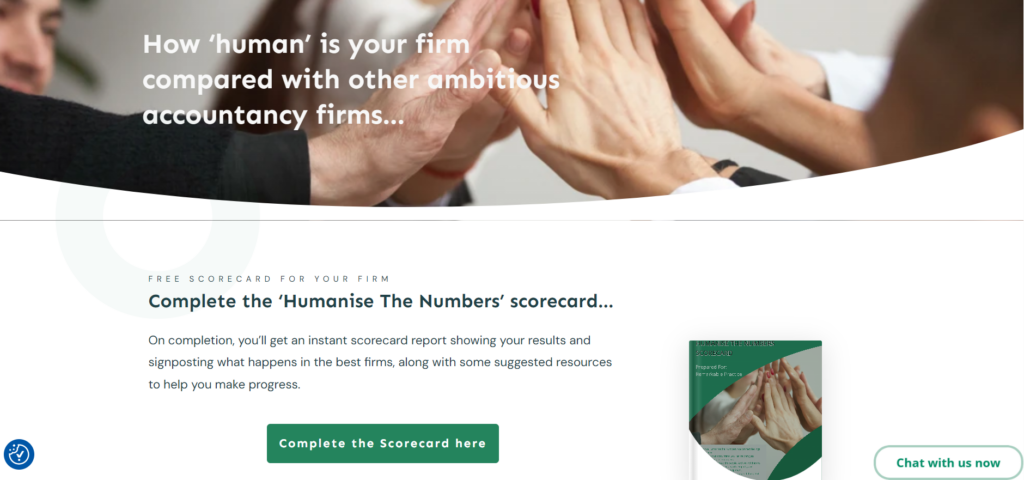
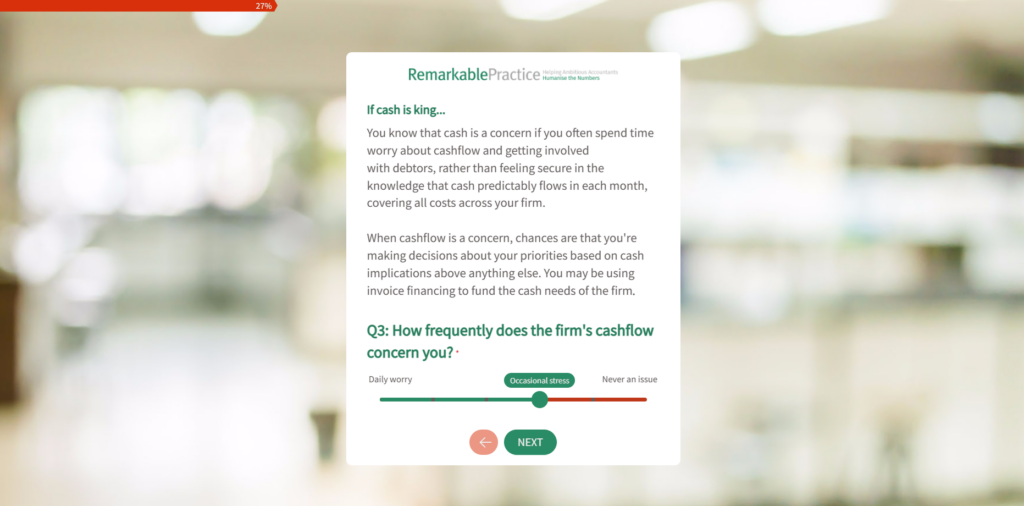
Any accountant who finds their way to our website can fill that out. In return, they receive a bespoke report that basically tells them how their firm stacks up against key measures of success.
It’s not just a summary of what they’ve answered. It’s a focused report that provides additional information and guidance with relevant resources, based on their answers. It basically proves that we know what we’re talking about, and makes an accountant on the fence about seeking help or not feel braver about approaching us.
This has led quite a number of our customers to join a key service offering that we have, called the “Accountants Growth Academy.”
And what happens after they sign up for your services?
Our assessments have actually been a really powerful onboarding tool for us. In order to go into an accountancy firm and understand their needs, that tends to require many conversations with them first. And in a firm of maybe 20 or 30 people there can be any number of challenges happening in parallel. Now, we know, broadly speaking, what the challenges could be, so by sharing assessments with the different individuals ahead of time, we can focus in very quickly and tease out what the specific challenges are in that particular firm. When we go into a meeting with them, we’re very well informed already.
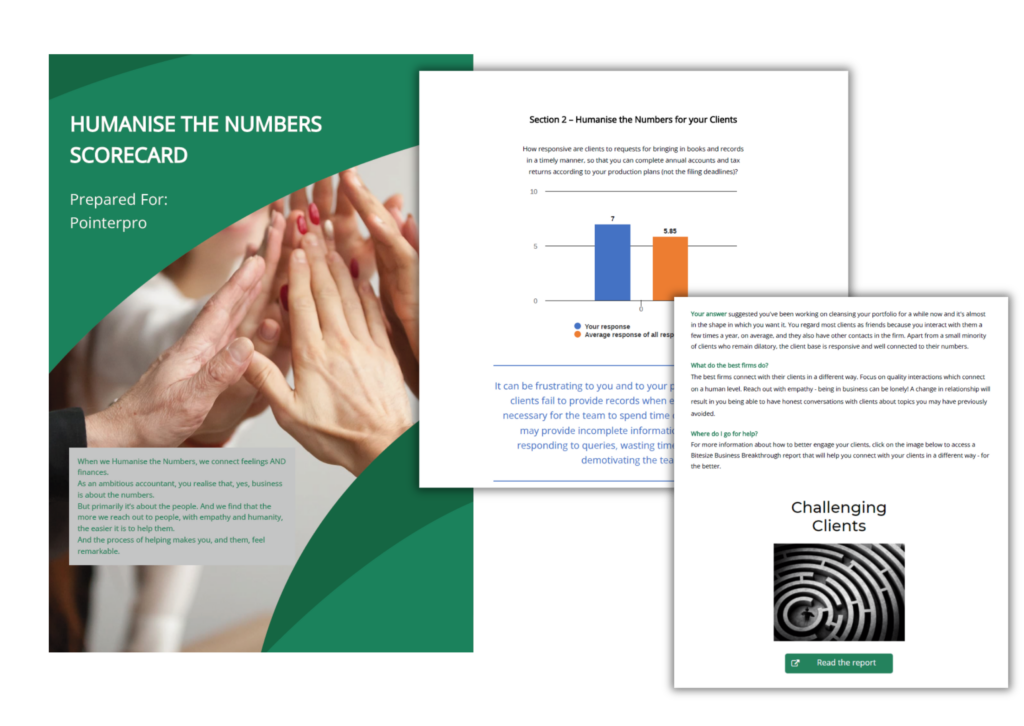
2. A conversational tool for community events
Is it fair to say Pointerpro helps you engage in better conversations?
Absolutely. In fact, another use case for us is assessments to enhance physical group events. Leading up to a recent learning event around leadership we organized for our target audience, we issued a short, very straightforward assessment to the subscribers. One that was focused on personal drivers. So, it was more like a personality test, not directly related to accounting.
When we sent them a welcome message with information about the agenda of the event day, we invited everyone to fill out this assessment. We told them, we would share the results with them on the day itself.
First of all, that created a sort of intrigue for people that were coming. And then, when they arrived, they all received their personal envelope with the personal report we generated and printed out for them – as part of their goody bag.

Very nice! And how did people react to this physical report?
It had a powerful effect on the room. Immediately getting something in hand that was relevant to them personally, enhanced the engagement of people right from the get-go.
And so, the rest of the day unfolded around the outcome of their assessments. It wasn’t just somebody standing in the front of the room, speaking about hypothetical cases. It created a really profound conversation among this group of accountants from different firms.
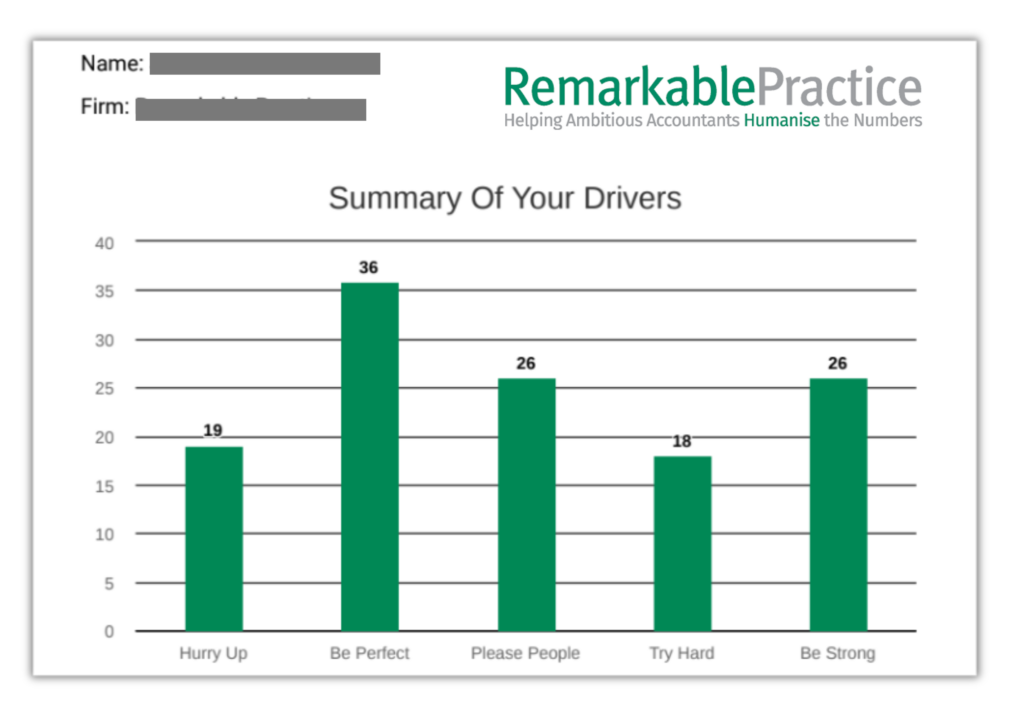
By the end of the day, everyone was sharing, connecting, and also sharing phone numbers, really wanting to keep the conversation going. These accountancy firm leaders left feeling they weren’t on their own. They were part of a community. One that we, Remarkable Practice, created for them.
And so, from our perspective, this was a powerful advisory marketing opportunity tactic as well. 80% of the people who completed those assessments went on to secure more work from us.
So, it was a successful way of marketing yourself for accountants?
Yes, although it wasn’t specifically designed for accounting lead generation. It just felt like such a simple thing to do. It was about 10 multiple choice questions, based on know-how we simply have in-house. That’s it. And it was really easy for the the user to fill out. But the delivery of it all was just a very powerful and authentic way of marketing ourselves for accountants, as you say. And everybody involved got value out of it.

80% of the people who completed those assessments went on to secure more work from us that directly connected with the subject matter of the assessment.
3. A strategy follow-up tool
Maybe, back to using Pointerpro after the accounting lead generation: How do you manage follow-up with our tool?
In terms of using Pointerpro for follow-up, I already mentioned how it helps us onboard customers and stakeholders efficiently. A good concrete example is our Strategy Health Assessment.
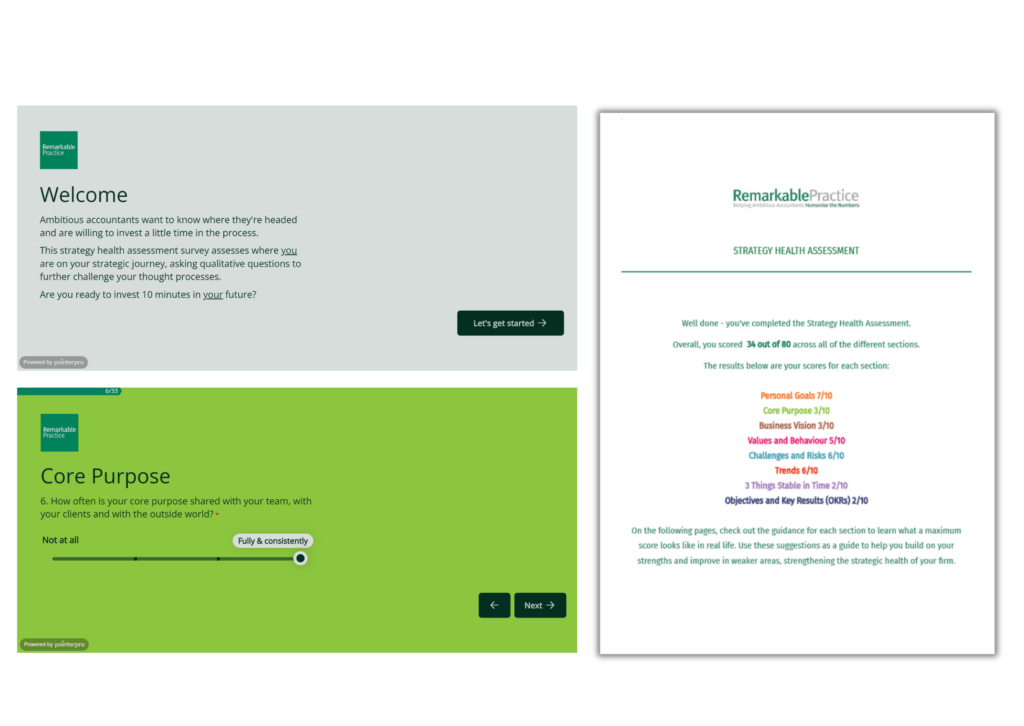
This is something that, again, the firms complete early on, during their journey with us. The assessment gives them an overview of the strategic health of their firm.
It focuses on their teams and their customer relationships, and also their connectedness with their values and purpose.
So a selection of people in an organization – for example, all of the senior leaders – complete this assessment individually. And, this is coupled with individual, bespoke reports. These are then very interesting to compare.
Quite often, what you’ll find is that one senior leader in the team will have a score of, say, 65%, and another senior leader in the same firm will have a score of, say, 30%. And essentially, they’re talking about the same firm and the same business. That clearly shines a light on disparities that need to be addressed.
That’s a good starting point for you to consult for them, I suppose?
Exactly. Because there needs to be an aligned understanding of what’s going on in the firm. Clearly, if some people understand one thing and other people understand something different, we need to address that first.
But the other thing that the Strategic Health Assessment achieves is this: Once we’ve identified the areas that need to be worked on, we then start identifying KPIs: key performance indicators. We actually call them “predictor indicators” because we set the target and then work with the firm to identify what they need to do in order to get there.
And then, when we meet back three months down the line, we can evaluate the progress with a follow-up assessment. And then again, at the end of maybe a consulting year, we get to give them one single number or score. They get to see the progress they’ve made in different areas, working with us. Ultimately it’s also a demonstration of return on investment for our customers, recurringly using our services.
Looking forward: Getting even more out of Pointerpro
Are you planning on any other applications?
Well, it just so happens we are thinking about an alternative version of our lead generation assessment, the “Humanise The Numbers” scorecard.
We have an email nurturing campaign running continuously. And that’s where people generally filter in from on the assessment.
The current assessment isn’t complicated. It doesn’t take a very long time to complete, but it does require real commitment to fill out. On one hand, that’s great, because that leaves us with the type of customers we really like to work with. It helps us pre-qualify customers, and as a result, there’s always a great match. Pretty much everybody who completes the assessment eventually becomes a customer. That’s no coincidence…
…but you wonder if you’re missing out on other great customers that didn’t complete it?
That’s right. And so, we’ve been thinking about developing an additional, lightweight version of the “Humanise The Numbers” scorecard. One that we can directly embed in an email campaign. That would make the marketing funnel a bit shorter, so to speak.
That’s definitely a best practice we recommend. Any other future projects?
Well, similarly, inspired by the existing use cases I explained earlier, we may develop another application.
When we’re consulting customers and we have meetings or workshops with them, this often ends with defining the next steps for everyone. However, nothing really enforces the actual execution. So instead of people writing these things down on sheets of paper, we’d love to build a “SMART goal” assessment that generates an explicit planning sheet PDF of some kind.
That would make it much easier for us to follow up and perhaps target our attention more specifically on expected progress that’s not being made.
Again, it all just personalizes and enhances the quality of our conversations and the support we offer to our customers.
How to get started with Pointerpro
Any tips for new or future Pointerpro users?
Well, from our own experience; I would say “don’t overthink it.”
Start simply by just thinking of the questions you’d really like an answer on from your customers. Or another way to think of it: “If you only had three Google searches you could do related to your business, what would it be?”
I’m saying this is because, from our experience, the very first questionnaire we created was immediately rather complex, with complicated reporting. So there was a steep learning curve. Probably, steeper than it had to be.
And it would be a pity if that discouraged anyone. Because, I’d just like to say that we can’t really ove emphasize the benefit that we’ve received from having your platform as a facility. It has enabled us to do our job better and it’s enabling our clients to do their jobs better too.
Any other likes, or maybe even dislikes?
Actually, I really like the webinar series that you’re running at the moment. The impression that I get – from the outside of Pointerpro – is that you have a really healthy environment, and that you’re really focused on helping your clients and supporting people in getting the most out of the investment that they’ve made with you.
Nice. And of course, I can only acknowledge that. Thank you so much for the nice words and for doing this interview!
With pleasure!


